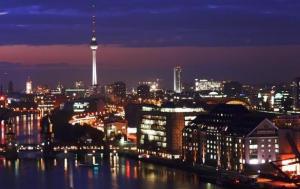 We’ve spent much of the last week exploring Berlin, attending the Next11 conference and meeting a few local startups. The biggest problem from a video entertainment standpoint? We both agree that Berlin feels like a better startup town than London.
We’ve spent much of the last week exploring Berlin, attending the Next11 conference and meeting a few local startups. The biggest problem from a video entertainment standpoint? We both agree that Berlin feels like a better startup town than London.
“Feels like” is an important disclaimer here. Berlin certainly doesn’t have the track record, local sophisticated investor class, nor does it have many current up and comers. The recent track record has been mostly riddled with US Web copycats. There’s no question London has a much more advanced, sophisticated startup ecosystem now. But it’s also one we’ve argued feels about as developed as it’s going to get. Berlin, on the other hand, like a startup itself, is just getting going and feels dynamic and full of promise.
A stand out company we met was called Research Gate. It’s a site where academics can connect, share papers and results and search for very specific information that can’t be found elsewhere online. It’s not as simple as being “a Facebook for academics,” because academics only need a network that specialized a few times a year. Instead, it aims to be not only a Facebook for academics but also as a LinkedIn for academics, offering specialized job seeker services, and an Amazon for academics, offering ecommerce deals and reviews on very specific lab equipment.
It was started by Ijad Madisch a German-born physician doing research at Harvard, who realized that academics only publish their successes. There was no engine for sharing the knowledge of why experiments fail 80% of the time.
Research gate is announcing it’s passed 1 million users Monday and has big name investors behind it, including Simon Levene of Index Ventures, Matt Cohler of Benchmark and Andrew Braccia of Accel. Cohler was one of the guys who suggested Research Gate leave Boston where the coding talent was expensive and limited, according to Madisch. His two suggestions: Berlin or Silicon Valley. London wasn’t even on the list. In fact, when we asked Madisch to compare and contrast the two cities, he said it was the first time he’d even really thought about it.
Ecosystem-wise, Berlin has some things going for it that most Western European capitals lack. For starters, it’s cheap to work and live there. Culturally and historically, Berlin is a more natural gateway between Europe’s mature Western economies and the surging talent in Eastern Europe. And Berlin has a surging creative class, largely made up of transplants. It’s become the place where misfits in Europe– people who want to be artists and creators, people who don’t fit in rigid social structures of cities like London– flock to do what they want.
That risk-taking, misfit creative class doesn’t always give rise to out-of-the-box startups, but it was a crucial ingredient in the development of startup ecosystems in San Francisco and Tel Aviv. It’s also something that London has long been criticized as lacking.
If London feels like a European New York; Berlin feels like a European Portland or an Austin or a Boulder. And perhaps one day a European San Francisco.